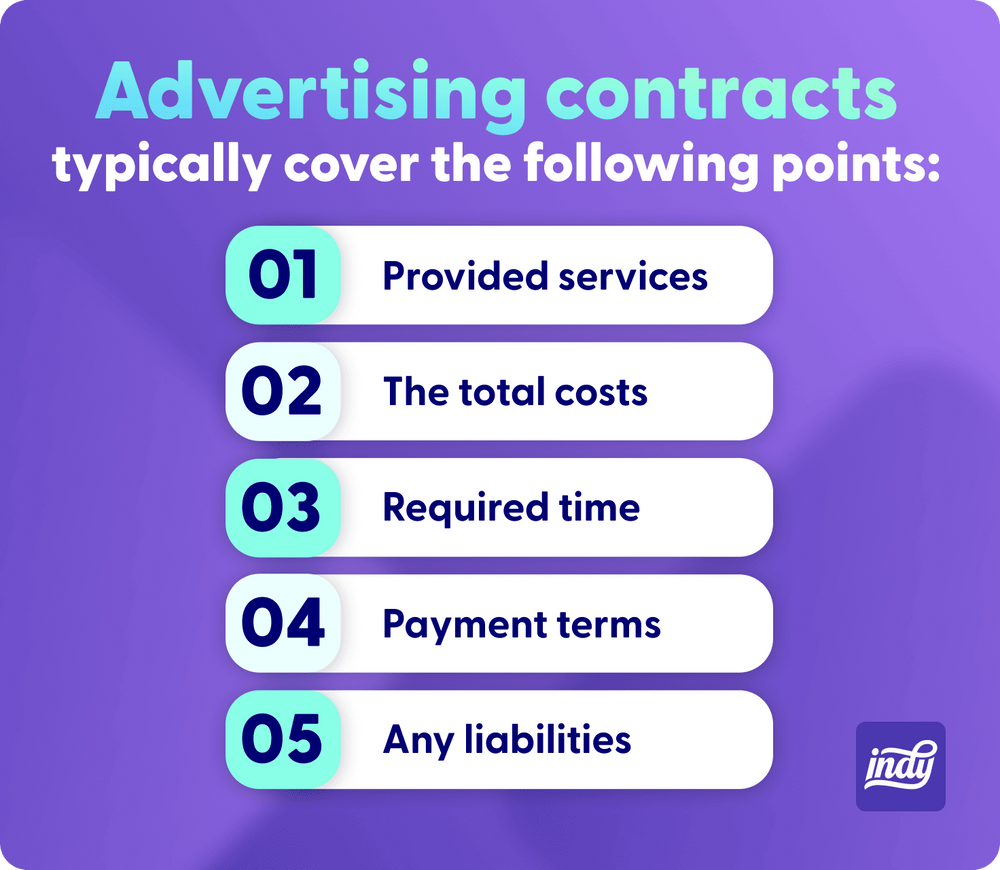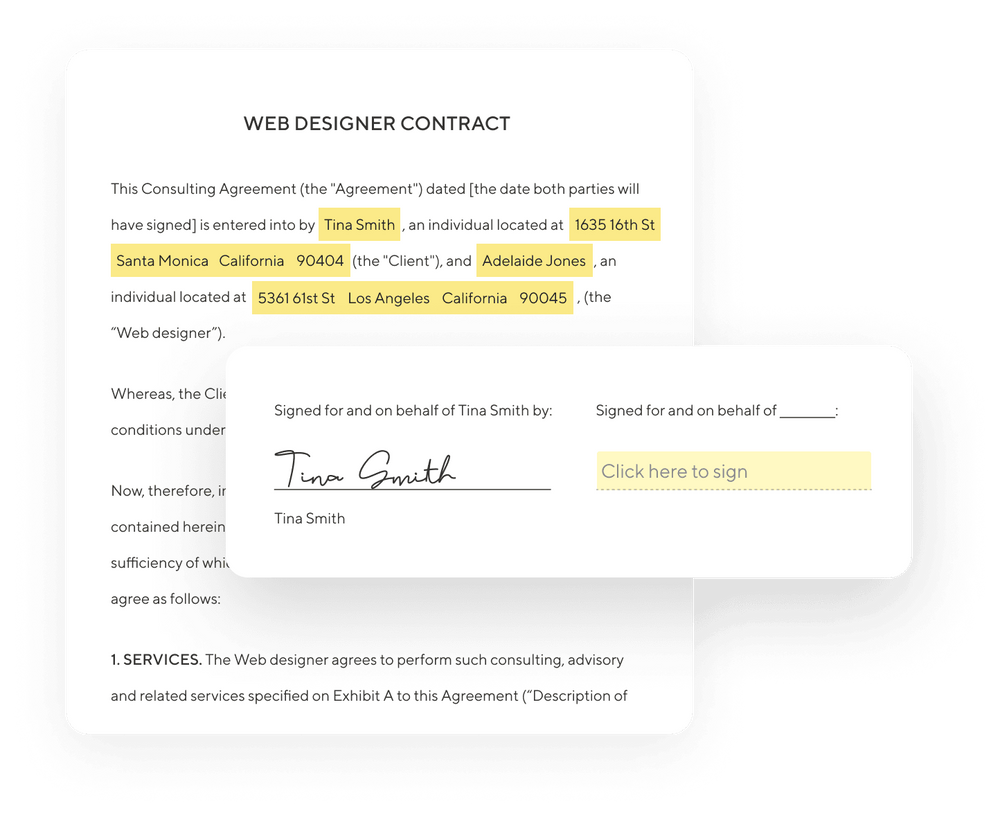With advertising turning into a driving force in how we promote products today, many have turned to contracts to define responsibilities and expectations. After all, advertisement agreements can help all parties receive what they expect. One of its main advantages is that you can both refer to it at any time and ensure a good cooperation experience.
Although many advertisements don't count as offers to enter a contract, a written agreement can protect both parties: The person or business that wants to place an ad and the agency or contractor that provides the space to do so.
Most advertising agreements take place after both parties have agreed on an advertising proposal. The contents of advertising contracts can vary depending on the host, the advertiser, and the type of ads you will run. There are, however, some essentials you will want to consider and some clauses that are specific to this type of contract.
What Is an Advertising Contract?
An advertising contract is a legally binding agreement that governs the relationship between two parties. In this case, a person or business that wants to place an ad and a person or business that will run it in a dedicated space. For example, a billboard company and those wishing to rent a billboard, or a blogger and those wanting to rent digital space to run ads on the blog.

Advertising contracts can vary slightly depending on the type of ads, the advertiser, and the host, but they typically cover the following points:
- The services you will provide as an advertising agency or independent contractor, as well as the roles, responsibilities, and expectations for both parties.
- The total costs for all advertisements and how each party will cover these costs.
- The advertising deliverables, for example, graphic designs for social media and online advertising, video advertising, etc.
- Any advertisement materials you will use to reach the goal, such as a PPC or PPV strategy, audio ads, promoted posts, etc.
- The display networks you will use.
- Whether you will provide website traffic statistics and google analytics information.
- The time you will require to finish the work.
- Who owns the copyrights of the resulting assets.
- The payment terms.
- How you will handle any confidential information.
- Any liabilities and steps for termination.
- Any other advertising services you will provide.

What's the Goal of an Advertising Contract?
Advertising contracts are legal documents that set the expectations of a project and its desired outcome. While it is possible to work without a formal agreement, it can be hard to enforce a deal when you don't have it in writing - whether you’re the host or the advertiser. This can help you avoid false or misleading statements and make sure you're working within an advertising budget.
Getting prior written approval for your advertising project is paramount, as it helps both parties align their expectations and responsibilities and ensure their legal interests are protected if there's a misunderstanding or something goes wrong.
There are several steps and parts to advertising campaigns, so defining all obligations in detail is essential. Not just how a client will pay for a service but what that service exactly entitles. For example, the type, size, and style of an ad.
Parts of an Advertising Contract
As an ad expert, there are several things you must have in your advertising agreement. Let's go through them in detail.
The Parties and the Date
The first component of your advertising agreement is to note the two parties involved: Someone who wants to place an ad and someone that will run it in a dedicated space. To do this, you usually need to include names, titles, and addresses. Keep in mind you can simplify the rest of the advertising agreement by stating what other names you will use to refer to the people in the agreement. The date is also an essential part of this section.
For example:
"This advertisement agreement (the "Agreement”) sets up the terms and conditions upon which [Client or Company name] (the "Company"), registered address [Address], enagages [Consultant name] (the "Consultant"), registered address [Address] as an advertiser for…”
The Advertising Work That Will Be Provided
The scope of your advertising work is an essential part of your contract. It's likely that you already have a statement of work from your creative brief. However, this is the part of the agreement where you should list everything you're going to do for a client and the different roles and responsibilities of each party involved. This is also the part of the agreement where you can list any advertising materials and channels you will use.
As an advertiser, it's essential to set appropriate expectations and not over-promise what you will be able to deliver. In this section, you can provide all the details of an advertising campaign. It's also important to define the project deliverables, if there are any. It's always better to use precise language to prevent any future misinterpretations.
For example:
The Company's main activity is [Describe the client's activities], whereas the Advertiser will provide [Describe your activities].
The Advertiser will provide [Amount] billboard ads in [Locations] for [Duration].
In addition to targeted ad campaigns, other services generally expected from advertisers can include:
- An audit of a client’s marketing ecosystem.
- New brand guidelines.
- Advertising copy.
- Market research.
- Plans for viral advertising and online advertisements.
- Website content and graphic design.
- Performance monitoring.
Don't forget to outline deadlines and estimates for meeting your advertising milestones, particularly if your campaign or plan stretches over a more extended period. For example, you can set up milestones for scripts, sketches, casting decisions, drafts, and final versions. You can also include targets for publication or airing of the final products. Working with updates will give you a little time between each delivery and offer you and your client a chance to assess how the campaign is progressing.
The wording for these clauses can be something like:
All work is to be completed and reviewed by [Date].
The Advertiser agrees to the following milestones: [List milestones].
The Advertising Costs and Expenses
Your advertising agreement should cover all payment details such as direct costs, payment methods, timeframes, and terms & conditions. This is quite a critical section, so be sure to include other essential details such as:
- When the payments will be due.
- Whether you require an upfront payment.
- The different types or methods of payments you can accept.
- Whether you will make payments at regular intervals or in one installment.
- Who will pay for other fees, services, and tools if required.
For example:
The Company will be invoiced through an invoicing system weekly in the amount of $[Sum]...
If your work includes content copy, image ads, or graphic design, you should also consider including a clause about provisions for reviews. Most advertisers will include some free revisions in their offer. Your written agreement should mention how many you are willing to provide and the cost if the client needs to pay for additional ones.
Approval windows can also be particularly beneficial for advertisers. This means that you give your clients a certain amount of time to accept the work (or review) you have done. If the window expires, your work can be considered automatically approved. It's also important to define what "approved" means, so both parties have clarity on the term.
For example:
Payment will be made within [Amount] days after receipt of the invoice. For past due invoices, a late fee of $[Sum] will apply...
If the Advertiser shall not hear from the Company within seven days after submission of the work, the work shall be considered accepted with no further changes permitted...
Intellectual Property and Nonexclusivity Clause
It's always better if your advertising agreement also includes information about who owns the assets you will create and whether you're allowed to work on other projects during the same period. Ensure you include this information in your contract in a transparent way.
For example, you can state that the client will own all assets you create for them as an advertiser, but you are also allowed to show them in your digital portfolio as examples of your previous work.
For example:
All intellectual property of the work produced will become the Company's intellectual property, as a work-made-for-hire...
Company and Consultant hereby agree that Advertiser shall be free to continue working for and taking on new clients, without regard to the Company.
Confidentiality
You will likely come across confidential business information while working for a client. Therefore, you should always include a statement in your advertising contract attesting that all information given to you by them will remain confidential.
For example:
The Advertiser will maintain the confidentiality of all the Company's information, including financial information, website usage analytics, etc.
Timeline and Termination
As an advertiser, you can agree on working open-ended or on a month-to-month basis, depending on the type of campaign or services you will be providing. But, unfortunately, there might come the time too when the contract can no longer be fulfilled - for example, because you can't handle the workload or your client has changed their mind about their marketing strategy.
You can include a clause defining the termination terms to anticipate these situations, such as requiring the client to give you a 30 day written notice before they terminate an agreement. Also, make sure you state all fees and reimbursements in the event of early termination.
For example:
The Parties might terminate this agreement before the specified end date by giving notice in writing [Number of days] days in advance...
This agreement may be terminated immediately in the event of a breach of the terms by either party...
Force Majeure
In the unlikely event that you might be unable to perform your advertising duties due to causes beyond your control (such as acts of nature or other unforeseen circumstances), it can be helpful to include a "Force Majeure" clause.
For example:
The Advertiser is not liable for any failure to perform due to causes beyond its reasonable control, such as natural disasters.
Other Factors
Your advertising contract might require other factors specific to a project or client—for example, access to specific tools, analytics, tracking KPIs, or third-party software. Anything you might not have included in the previous parts can go in your advertising contract's "Other Factors" section.
Date, Signature, and Page Numbers
Remember to leave a space at the bottom of your development contract where you and your client can sign. It would be best if you also left an empty area for initials on each page. If your agreement has multiple pages, make sure you number them.
The Benefits of Using an Indy Contract Template
If you don’t have the time or confidence to write your own advertising contract from scratch, you can use a template. With Indy, you can create, send, and sign legally vetted advertising agreements in minutes.
This single-stop freelancing platform provides all the tools you need for your business in one place, including an impressive selection of hundreds of contract templates, NDAs, and subcontractor agreements for freelance and small advertisers. Indy has one essential advantage: When you use Indy, you can connect all your contracts to a client or a project, generate electronic signatures, and save them for later use.
Summary
An advertising agreement is a legally-binding document between an advertising contractor, agency, and client. Advertising contracts can help you define the terms and scope of your work and how you will communicate about a campaign or project and arrange payments.
If you want to benefit from a legally-sound contract, consider creating a free account with Indy. You can customize your agreements and start making a lasting impression with your advertising clients in just minutes.



